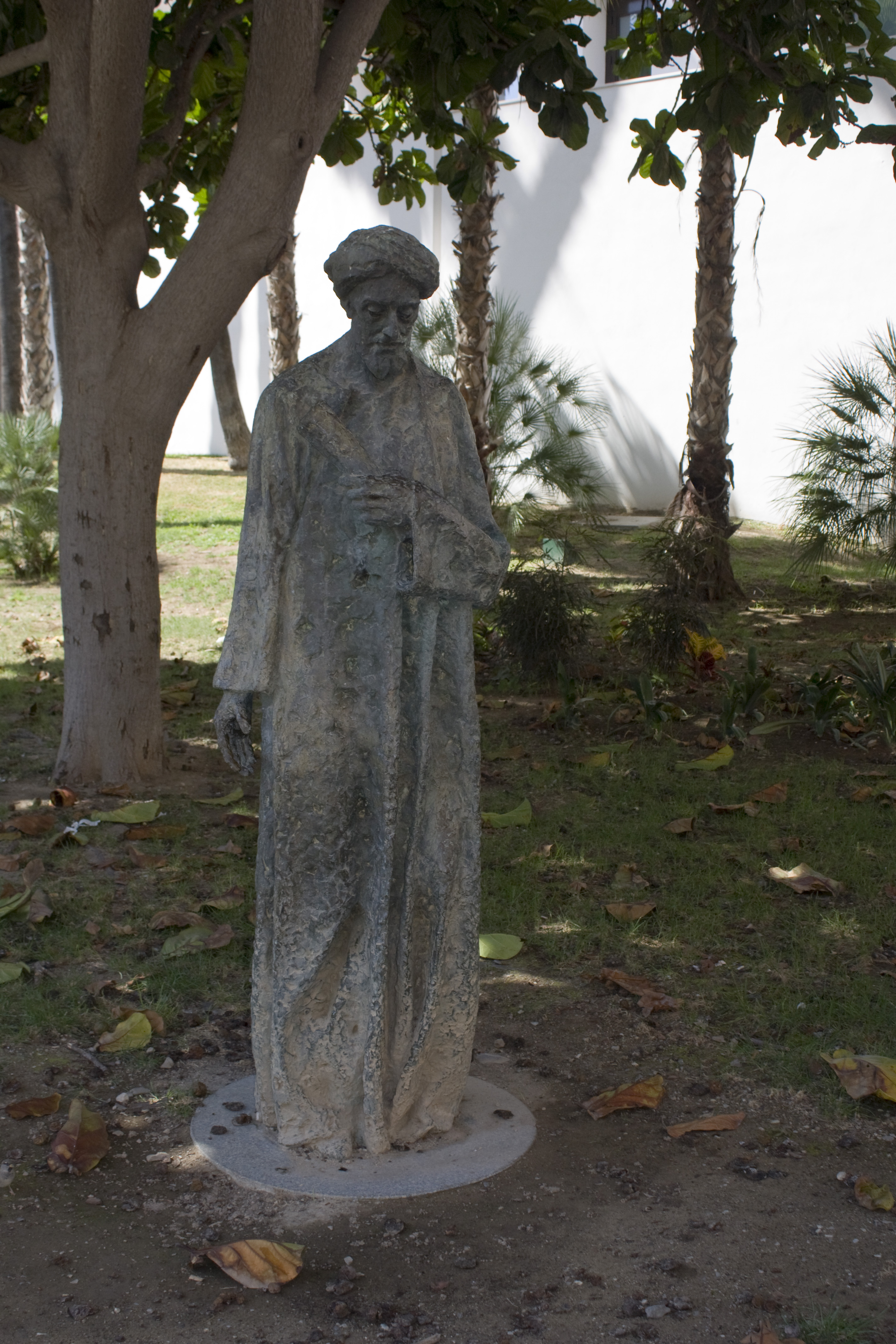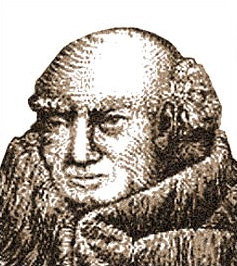|
David Of Dinant
David of Dinant ( 1160 – c. 1217) was a pantheistic philosopher. He may have been a member of, or at least been influenced by, a pantheistic sect known as the Amalricians. David was condemned by the Church in 1210 for his writing of the " Quaternuli" (Little Notebooks), which forced him to flee Paris. When and where he died is unknown; all that can be ascertained is that he died after the year 1215, as he was condemned again in the council of 1215. Since David's works were banned, most of what is known of him is from the writings of his contemporaries and opponents, chiefly Albert the Great and St. Thomas Aquinas. David's philosophy was that everything could be divided among bodies, minds, and eternal substances. The indivisible substrate or constituent of bodies is matter (''hyle''); of minds or souls, intellect (''nous''); and of eternal substances, God (''Deus''). These three, matter, intellect, and God, are actually one and the same. Consequently, all things, material, in ... [...More Info...] [...Related Items...] OR: [Wikipedia] [Google] [Baidu] |
Pantheism
Pantheism is the belief that reality, the universe and the cosmos are identical with divinity and a supreme supernatural being or entity, pointing to the universe as being an immanent creator deity still expanding and creating, which has existed since the beginning of time, or that all things compose an all-encompassing, immanent god or goddess and regards the universe as a manifestation of a deity. This includes all astronomical objects being viewed as part of a sole deity. The worship of all gods of every religion is another definition but is more precisely termed Omnism. Pantheist belief does not recognize a distinct personal god, anthropomorphic or otherwise, but instead characterizes a broad range of doctrines differing in forms of relationships between reality and divinity. Pantheistic concepts date back thousands of years, and pantheistic elements have been identified in various religious traditions. The term ''pantheism'' was coined by mathematician Joseph Raphson ... [...More Info...] [...Related Items...] OR: [Wikipedia] [Google] [Baidu] |
Peter Of Corbeil
Peter of Corbeil (died 3 June 1222), born at Corbeil, was a preacher and canon of Notre Dame de Paris, a scholastic philosopher and master of theology at the University of Paris, ca 1189. He is remembered largely because his aristocratic student Lotario de' Conti became pope as Innocent III. In 1198 Innocent appointed him to the sinecures of prebendary and archdeacon of York. The following year Innocent raised his former master to the see of Cambrai, an immensely important diocese with a jurisdiction that covered Flanders. Peter became Archbishop of Sens in 1200. His interest in the intellectual life of Paris was undiminished: in 1210 he convoked a council at Paris that forbade the teaching, whether in public or privately, of the recently rediscovered Natural Philosophy (the Physics and very likely the Metaphysics) of Aristotle and the recently translated commentaries on Aristotle of Averroës (''nec libri Aristotelis de naturali philosophia nec commenta legantur Parisius publice ... [...More Info...] [...Related Items...] OR: [Wikipedia] [Google] [Baidu] |
Joachim Of Floris
Joachim of Fiore, also known as Joachim of Flora and in Italian Gioacchino da Fiore (c. 1135 – 30 March 1202), was an Italian Christian theologian, Catholic abbot, and the founder of the monastic order of San Giovanni in Fiore. According to theologian Bernard McGinn, "Joachim of Fiore is the most important apocalyptic thinker of the whole medieval period." The Divine Comedy of Dante Alighieri is one of the most famous works inspired by his ideas. Later followers, inspired by his works in Christian eschatology and historicist theories, are called Joachimites. Biography Born in the small village of Celico near Cosenza, in Calabria (at the time part of the Kingdom of Sicily), Joachim was the son of Mauro de Celico, a well-placed notary, and of Gemma, his wife. He was educated at Cosenza, where he became first a clerk in the courts, and then a notary himself. In 1166–1167 he worked for Stephen du Perche, archbishop of Palermo (c. 1167–1168) and counsellor of Margaret of ... [...More Info...] [...Related Items...] OR: [Wikipedia] [Google] [Baidu] |
Cathar
Catharism (; from the grc, καθαροί, katharoi, "the pure ones") was a Christian dualist or Gnostic movement between the 12th and 14th centuries which thrived in Southern Europe, particularly in northern Italy and southern France. Followers were described as Cathars and referred to themselves as Good Christians; in modern times, they are mainly remembered for a prolonged period of religious persecution by the Catholic Church, which did not recognize their unorthodox Christianity. Catharism emerged in Western Europe in the Languedoc region of southern France in the 11th century. Adherents were sometimes referred to as Albigensians, after the French city Albi where the movement first took hold. Catharism was initially taught by ascetic leaders who set few guidelines, leading some Catharist practices and beliefs to vary by region and over time. The movement was greatly influenced by the Bogomils of the First Bulgarian Empire, and may have originated in the Byzantine Empire, ... [...More Info...] [...Related Items...] OR: [Wikipedia] [Google] [Baidu] |
1913 Catholic Encyclopedia
The ''Catholic Encyclopedia: An International Work of Reference on the Constitution, Doctrine, Discipline, and History of the Catholic Church'' (also referred to as the ''Old Catholic Encyclopedia'' and the ''Original Catholic Encyclopedia'') is an English-language encyclopedia published in the United States and designed to serve the Catholic Church. The first volume appeared in March 1907 and the last three volumes appeared in 1912, followed by a master index volume in 1914 and later supplementary volumes. It was designed "to give its readers full and authoritative information on the entire cycle of Catholic interests, action and doctrine". The ''Catholic Encyclopedia'' was published by the Robert Appleton Company (RAC), a publishing company incorporated at New York in February 1905 for the express purpose of publishing the encyclopedia. The five members of the encyclopedia's Editorial Board also served as the directors of the company. In 1912 the company's name was changed to ... [...More Info...] [...Related Items...] OR: [Wikipedia] [Google] [Baidu] |
Gundisalvi Of Segovia
Dominicus Gundissalinus, also known as Domingo Gundisalvi or Gundisalvo ( 1115 – post 1190), was a philosopher and translator of Arabic to Medieval Latin active in Toledo. Among his translations, Gundissalinus worked on Avicenna's ''Liber de philosophia prima'' and ''De anima'', Ibn Gabirol's ''Fons vitae'', and al-Ghazali's ''Summa theoricae philosophiae'', in collaboration with the Jewish philosopher Abraham Ibn Daud and Johannes Hispanus. As a philosopher, Gundissalinus crucially contributed to the Latin assimilation of Arabic philosophy, being the first Latin thinker in receiving and developing doctrines, such as Avicenna's modal ontology or Ibn Gabirol's universal hylomorphism, that would soon be integrated into the thirteenth-century philosophical debate. Life Born presumably in the Iberian Peninsula around 1115–1125, Gundissalinus received his education in Chartres, supposedly following the teaching of William of Conches and Thierry of Chartres. Since 1148, Gundissalinus ... [...More Info...] [...Related Items...] OR: [Wikipedia] [Google] [Baidu] |
Fons Vitae
Fons may refer to: Places * Fons, Ardèche, France * Fons, Gard, France * Fons, Lot, France Other uses * '' Fons memorabilium universi'', a Renaissance encyclopedia * Fontus, an ancient Roman water deity * Leonard Fons (1903–1956), American politician * Jorge Fons Pérez (1939-2022), Mexican film director * A Dutch masculine given name, see Alphons Alphons (Latinized ''Alphonsus'', ''Adelphonsus'', or ''Adefonsus'') is a male given name recorded from the 8th century (Alfonso I of Asturias, r. 739–757) in the Christian successor states of the Visigothic kingdom in the Iberian peninsul ... * Fons, from Formuleichon Fons See also * Fon (other) {{disambiguation, geo ... [...More Info...] [...Related Items...] OR: [Wikipedia] [Google] [Baidu] |
Avicebron
Solomon ibn Gabirol or Solomon ben Judah ( he, ר׳ שְׁלֹמֹה בֶּן יְהוּדָה אִבְּן גָּבִּירוֹל, Shlomo Ben Yehuda ibn Gabirol, ; ar, أبو أيوب سليمان بن يحيى بن جبيرول, ’Abū ’Ayyūb Sulaymān bin Yaḥyá bin Jabīrūl, ) was an 11th-century Andalusian poet and Jewish philosopher in the Neo-Platonic tradition. He published over a hundred poems, as well as works of biblical exegesis, philosophy, ethics and satire. One source credits ibn Gabirol with creating a golem, possibly female, for household chores. In the 19th century it was discovered that medieval translators had Latinized Gabirol's name to Avicebron or Avencebrol and had translated his work on Jewish Neo-Platonic philosophy into a Latin form that had in the intervening centuries been highly regarded as a work of Islamic or Christian scholarship. As such, ibn Gabirol is well known in the history of philosophy for the doctrine that all things, including ... [...More Info...] [...Related Items...] OR: [Wikipedia] [Google] [Baidu] |
Johannes Scotus Eriugena
John Scotus Eriugena, also known as Johannes Scotus Erigena, John the Scot, or John the Irish-born ( – c. 877) was an Irish people, Irish Neoplatonism, Neoplatonist Philosophy, philosopher, Theology, theologian and poet of the Early Middle Ages. Bertrand Russell dubbed him "the most astonishing person of the 9th century, ninth century". The Stanford Encyclopedia of Philosophy states he "is the most significant Irish intellectual of the early monastic period. He is generally recognized to be both the outstanding philosopher (in terms of originality) of the Carolingian Empire, Carolingian era and of the whole period of Latin philosophy stretching from Boethius to St. Anselm, Anselm". He wrote a number of works, but is best known today for having written ''De Divisione Naturae'' ("The Division of Nature"), or ''Periphyseon'', which has been called the "final achievement" of Ancient Greek philosophy, ancient philosophy, a work which "synthesizes the philosophical accomplis ... [...More Info...] [...Related Items...] OR: [Wikipedia] [Google] [Baidu] |
Intellect
In the study of the human mind, intellect refers to, describes, and identifies the ability of the human mind to reach correct conclusions about what is true and what is false in reality; and how to solve problems. Derived from the Ancient Greek philosophy term ''nous'', ''intellect'' derived from the Latin ''intelligere'' (“to understand”), from which derives the term ''intelligence'' in the French and English languages. The discussion of intellect is in two areas of knowledge that concern the relation between intelligence and intellect. * In classical philosophy and in medieval philosophy the intellect (''nous'') is the subject of the question: How do people know things? In Late Antiquity and in the Middle Ages, the intellect was the conceptual means of reconciling the religious faith of monotheism with the facts of philosophy and science about Nature, a reconciliation that would make the intellect the conduit between the human soul, and the divine intellect of the cosmos ... [...More Info...] [...Related Items...] OR: [Wikipedia] [Google] [Baidu] |
Matter
In classical physics and general chemistry, matter is any substance that has mass and takes up space by having volume. All everyday objects that can be touched are ultimately composed of atoms, which are made up of interacting subatomic particles, and in everyday as well as scientific usage, "matter" generally includes atoms and anything made up of them, and any particles (or combination of particles) that act as if they have both rest mass and volume. However it does not include massless particles such as photons, or other energy phenomena or waves such as light or heat. Matter exists in various states (also known as phases). These include classical everyday phases such as solid, liquid, and gas – for example water exists as ice, liquid water, and gaseous steam – but other states are possible, including plasma, Bose–Einstein condensates, fermionic condensates, and quark–gluon plasma. Usually atoms can be imagined as a nucleus of protons and neutrons, and a surro ... [...More Info...] [...Related Items...] OR: [Wikipedia] [Google] [Baidu] |
.jpg)





